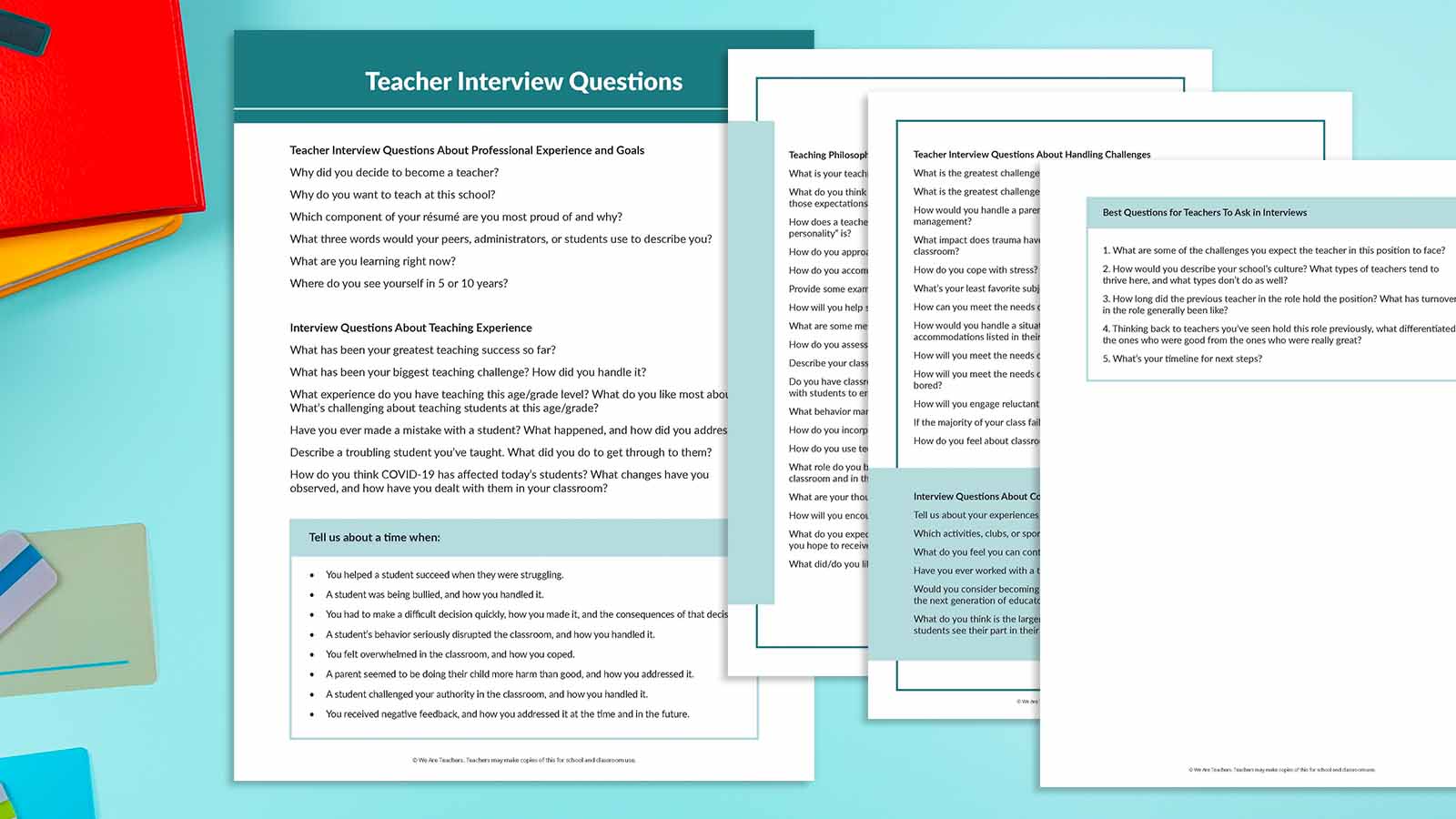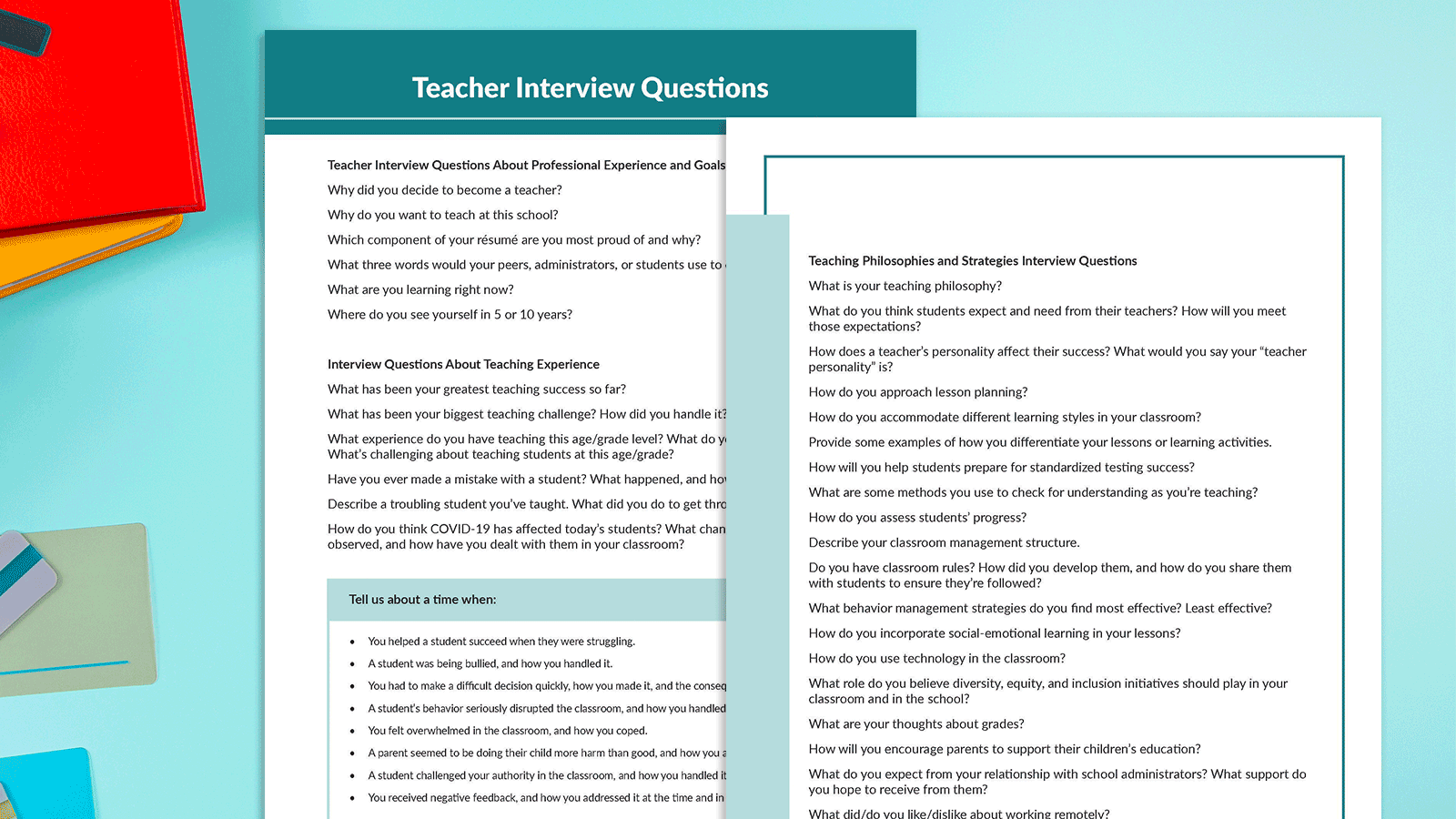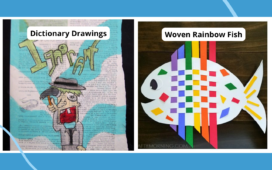Getting ready to interview for a new teaching job? It’s time for all the feelings—excitement, anxiety, and more anxiety. This is your time to engage with principals and showcase your experiences, beliefs, and skills. The key to a good interview is preparation. We talked to Kimberly Liscomb, principal at Cony Middle and High School in Augusta, Maine, and Raquel Martinez, principal in Pasco, Washington. They shared their favorite interview questions with us, plus what they’re looking for in teacher candidates.
One thing to know about interviewing is that principals aren’t looking for you to be perfect or have had every experience ever. “Being honest and truthful and up-front is more of an advantage than someone who can’t answer a question but is trying anyway,” says Martinez. Principals want authenticity and someone who can join and contribute to the school community, and that could be you!
Check out the principal-vetted teacher interview questions and tips for answering below. Plus fill out the form on this page to grab your free printable list of questions to help you prepare for your next interview.

Jump to:
Teacher Interview Questions About Professional Experience and Goals
What are your strengths and weaknesses?
This is a classic question, so be ready for it. Liscomb asks this question to see how reflective candidates are about their own practice. “Do they know what they are good at and what they need work on?” she told us. “Do they provide specific examples of how they are working on the areas of concern?”
Prepare to answer this question by listing out your strengths and weaknesses. For each strength, write down one example. And make sure you can explain how you’re working to improve your weaknesses so principals know that you have a growth mindset.
Tell me about your background and experience and how it relates to our school.
This question is broad and specific at the same time. Martinez asks it to get a feel for how a teacher’s experiences align with her school’s mission. For example, if the school is focused on project-based learning, how do you either teach using project-based learning principles, or how are you ready to join a team that does?
Why did you become a teacher?
It seems like a trite softball question, but don’t let that fool you. Most administrators are looking for something more than “I’ve just always loved kids.” Martinez wants to hear your story. Was there a teacher or teaching experience that inspired you? How did you get here? Answer honestly with anecdotes or examples that paint a clear picture of the journey that you took to become a teacher.
Why do you want to teach at this school?
Research, research, and research more before your interview. Google everything you can about the school. Do they have a theater program? Are the students involved in the community? What type of culture does the principal promote? Use social media to see what the school proudly promoted most recently. Then, ask around. Use your network of colleagues to find out what (current and former) teachers loved and hated about it. The point of all this digging? You need to know if this school is a good fit for you. If it is a good fit, you’ll demonstrate how much you want the job by explaining how you would get involved with all the amazing school programs you’ve heard so much about!
Which component of your resume are you most proud of and why?
This question gives you a chance to shine. Mention the successes you’ve had, including awards, achievements during student teaching, your student data at your last school, etc. You can also take the opportunity to talk about things like professional organization memberships, and you can relay your interest in staying up-to-date on the latest educational research or taking advantage of professional development opportunities.
What three words would your peers, administrators, or students use to describe you?
Having been caught off-guard by this prompt at a previous competitive interview, I would encourage you to have some thoughtful options to describe yourself. It’s tempting to say things you think your new boss might want to hear, like intelligent or hardworking, but don’t discount character traits or terms that paint you as a team player among peers and a role model for students. Some options to consider are empathetic, creative, caring, and cooperative.
What are you learning right now?
It’s no secret that successful teachers pursue all the professional development opportunities they can. Share a PD book you’ve been reading, a recent TED Talk that inspired you, or something new about your subject matter you learned recently. You want to communicate that you are always willing to learn.
Where do you see yourself in 5 or 10 years?
This question gets at your long-term personal goals. Principals may ask this to get a feel for your leadership potential, e.g., do you want to be an instructional coach or principal? Or they may ask it because they’re trying to get a feel for how this job aligns with your long-term vision. Don’t lie. If you’re not going to be in the classroom much longer, explain what you bring now and how you can support students during your time with the school, and see what happens from there.
What are three compelling reasons you are the best candidate for this position?
Liscomb asks this question to get a sense of what you’ll bring to the school. Essentially she’s asking: Why should I hire you? And as she’s listening, she may try to align what you’re saying with what you demonstrated during the interview. If you say you’re innovative, did she hear examples of how you have innovated? She’s also listening to hear what you can bring to the school. Do you research ahead of time so you can connect your strengths with the school you’re interviewing with?
Teacher Interview Questions About Experience
Describe a lesson that you have given to your students.
Through recalling a specific lesson, Liscomb is “looking for someone who recognizes the individual needs of their students. A teacher who plans for various instructional strategies and who creates lessons that engage their students. A teacher who makes connections to prior knowledge, higher-order thinking skills, and connections to other disciplines.” She’s also looking for enthusiasm about the content and grade levels they teach.
Describe a time when students didn’t understand your lesson. What did you do?
Liscomb asks this question to see how flexible you are in the moment. Do you pay attention to student learning, not just completing the day’s agenda? And can you use data to inform instruction, even in the moment? One way to prepare for this question is to jot down daily reflections about what happened during a lesson and how you responded so you have examples on hand when you’re interviewing.
What has been your greatest teaching success so far?
Go ahead and brag! This is your place to share the time you reached a really troubled student, or raised your class’s average standardized test scores by five points, or were voted teacher of the year. Be sure to share how you achieved your success, including any help you received from others, and what you learned from the experience.
What has been your biggest teaching challenge? How did you handle it?
Choose a challenge directly related to education that you’ve overcome or are actively working on. The challenge could be big or small, but focus on how you tackled it and what you learned.
What do you like most about this grade level? What is challenging about teaching this grade?
You may be asked these teacher interview questions if you’re applying for a specific grade. If you have experience, share it. If you don’t, talk about what you like in general or what you’re looking forward to either experiencing or learning. Keep your response focused on all kids, not your own children if they’ve gone through that age already.
Have you ever made a mistake with a student? What happened and how did you address it?
Your interviewer is asking you to be a bit vulnerable with these teacher interview questions, but be careful with your choice of anecdote. While we’ve all made mistakes when dealing with students, what you’re really looking for is an example where you made a mistake and then addressed it appropriately. Think carefully about a situation in which you didn’t handle things as well as you could have, but you got it right in the end. Explain why you handled it the way you did initially, what caused you to reflect and change your mind, and how the situation was resolved.
Describe a tough student you’ve taught. What did you do to get through to them?
This question addresses more than just your reluctant learners. This speaks to any discipline measures you’ve had to address. As a teacher, you need to control the classroom and provide a safe space for all of your students. Think about your approach to troubling students and any successes you’ve had in the past.
How do you think COVID-19 has affected today’s students? What changes have you observed, and how have you dealt with them in your classroom?
These teacher interview questions are a chance to provide a succinct example, not to rant or pontificate. Give a few examples, and focus on how you’ve grown and adapted as a teacher in a proactive and positive way. No school district wants to hire a teacher who is going to throw up their hands and proclaim, “These kids just don’t listen anymore!” Let them know you are going to meet your students where they are and help them reach your high standards.
Tell us about a time when …
Good interviewers ask a lot of questions about your personal experiences. Bring your personal experiences into your answers with examples that relate and show interviewers something about you (your sense of humor, your problem-solving ability, your collaboration skills, etc.). Here are some questions to prepare for:
Tell us about a time when:
- You helped a student succeed when they were struggling
- A student was being bullied and how you handled it
- You had to make a difficult decision quickly, how you made it, and the consequences of that decision
- A student’s behavior seriously disrupted the classroom and how you handled it
- You felt overwhelmed in the classroom and how you coped
- A parent seemed to be doing their child more harm than good and how you addressed it
- A student challenged your authority in the classroom and how you handled it
- You received negative feedback and how you addressed it at the time and in the future
Teaching Philosophies and Strategies Interview Questions
What is your teaching philosophy?
Don’t answer this question with a clichéd, generic response. Write out your mission statement before the interview, and be ready to recite it and support it with examples. You want to show that you’re enthusiastic and passionate, and that you’re ready to apply your mission to a new classroom.
What do you think students expect from their teachers? How will you meet those expectations?
These teacher interview questions can also be a tricky. Avoid phrases like “Students want teachers to be their friend.” Instead, target specific expectations like “They want to be supported and feel that their teacher respects their opinions and feelings.” Consider other expectations like a safe classroom environment, the freedom to ask for help when they need it, flexibility under difficult circumstances, and open-minded approaches to teaching and learning.
How does a teacher’s personality affect their success? What would you say your “teacher personality” is?
Again, the answer to these questions is all about the wording. Avoid phrases like “I’m the mean teacher” or “I’m the fun teacher.” Instead, be thoughtful about how you present yourself to students and parents. Are you stern but fair? Entertaining but also focused on achievement? Kind but able to control misbehavior when needed? Think about how you truly approach teaching, and be honest. This question will help everyone determine if you’re a good fit for the position.
How do you approach lesson planning?
This question asks you about your work process. Are you a big-picture thinker or do you enjoy details? Do you plan weeks in advance or are you more responsive? However you explain your lesson-planning approach, be sure to mention how you incorporate and are responsive to student data.
Learn more: 30 Lesson Plan Examples for Every Grade Level and Subject
How do you accommodate different learning styles in your classroom?
First, ensure you understand what learning styles are (visual, auditory, etc.) . Then, provide examples of differentiating a specific lesson for the various styles.
Provide some examples of how you differentiate your lessons or learning activities.
Differentiation is a hot topic in education and refers to customizing the content, process, product, and learning environment for various situations and students, including students with disabilities and those who are English language learners. Even if you’ve never had your own classroom (yet), plan a response to this question using your coursework or student teaching.
Learn more: What Is Differentiated Instruction?
How will you help students prepare for standardized testing success?
Standardized tests are another hot topic, and you’ll likely be asked at least one question about them. Regardless of your own opinions, be prepared to share how you help students overcome test anxiety by preparing well and applying good test-taking strategies.
What are some methods you use to check for understanding as you’re teaching?
Explain how your instruction will be responsive to students’ needs. Will you incorporate tech tools for assessments? Or implement exit slips summarizing what they’ve learned? Do you have a quick-check method, like thumbs-up/thumbs-down, to quickly scan for understanding?
How do you assess students’ progress?
Break out all your knowledge on the types of assessment in education and share how you implement the different kinds in your classroom. Explain the types of quizzes you give because you know that they’re most telling about students’ strengths and weaknesses. Give insight into how you use oral reports, group projects, and seat work to determine who’s struggling and who’s ahead.
Learn more: Formative, Summative, and More Types of Assessment
Describe your disciplinary procedures.
When Liscomb asks this, she is looking for a teacher who can focus on the individual needs of students. “I am looking for a teacher who understands that it is very important to build relationships with students,” she told We Are Teachers. “We need a teacher who can work with all students even though some may get dysregulated at times.” Prepare for questions, like this, about behavior management by reviewing the school’s philosophy and talking about how your approach aligns with theirs.
Do you have classroom rules? How do you develop them? And how do you ensure they are being followed?
This is a pretty straightforward question. Give examples of rules and how you create them, and take the opportunity to talk more broadly about what you value in your classroom. Do you set up rules together because you value collaboration? Have you found that using positive reinforcement is the most effective way to manage rules? Connect your procedures with values.
What behavior management strategies do you find most effective? Least effective?
Do you use charts to track behavior? Give prizes for success, or punishment for rule breakers? What do you do when a student is struggling emotionally? How do you work with parents to deal with problem behavior? There’s a lot to consider here—give examples and talk about why these strategies work for your philosophy of teaching.
Learn more: Classroom Management Strategies and Techniques
How do you incorporate social-emotional learning in your lessons?
When Martinez asks about social-emotional learning, she’s listening to hear how candidates understand students. Do they understand that students have their own stories and may not have the perfect story at home? And how do you understand your students and bring that understanding to your classroom management? Talk about how you get to know and build relationships with students, and how you support students’ core SEL competencies.
Learn more: Ways to incorporate SEL into the school day
How do you use technology in the classroom?
Principals will likely have technology that they use at their school. It’s OK if you haven’t used those specific programs, but talk about how you integrate new programs and how you support students’ learning while using that technology. If you have a favorite program, you can talk about that too.
Learn more: Technology Resources
What role do you believe diversity, equity, and inclusion initiatives should play in your classroom and in the school?
Many school districts want to know that incoming educators are open to having the challenging conversations and doing the difficult work of building anti-racist curriculum and policies. In more traditional districts, interviewers might be on the lookout for teachers whose views might be “too progressive” for the parents in their schools. Answer these questions truthfully. If you feel strongly that anti-racist policies are important and want DEI initiatives to be respected and valued in the district where you work, you should know about that before you accept a teaching position.
Learn more: Anti-Racist Professional Development Books
What are your thoughts about grades?
Grading and assessment are set to become hot topics in education in the next few years. While many feel that we’ve become lax in grading during the pandemic and want to tighten up traditional grading, others are arguing for drastically changing our grading systems. Regardless of what you believe personally about this issue, it’s a good idea to start by knowing how the district you are interviewing in handles grades. You can (and should!) absolutely discuss how you believe standards-based grading to be superior to traditional methods, but make sure you also state that you can and will follow district protocols and believe you can accurately measure student learning in this way.
How will you encourage parents to support their children’s education?
Teachers are the first contact between home and school, so administrators may see you as a “publicist” for the school, reinforcing the culture, strengths, and values with parents. Answer this question with concrete ideas. Share how parents will volunteer in your classroom and how you’ll maintain regular contact, providing updates on both positive and negative events. Plus, how will you deal with helicopter parents?
What do you expect from your relationship with school administrators? What support do you hope to receive from them?
Your new principal or team lead wants to know what it’s like to work with you. Will you expect a lot of hand-holding, or are you more independent? What type of supervision helps you thrive? Give concrete examples of ways you think administrators can better support teachers. Be tactful but honest.
Teacher Interview Questions About Handling Challenges
What is the greatest challenge facing teachers today?
Remote learning? Hybrid learning? Diversity and inclusion? Social-emotional learning? Engaging parents? Think about your specific school, district, city, and state. What issue is most pressing, and what can you, as a teacher, do to help?
What is the greatest challenge facing students today?
Think about the specific population at the school where you’re interviewing. What major issues do those kids face? Prejudice and intolerance? Parental support? Uncertainty about their futures? Remember to include how you feel you can help address those challenges in your response.
How would you handle a parent challenging your teaching methods/curriculum/classroom management?
Even a district that is going to strongly support its teachers against parent complaints may ask how you will handle such conflicts when they arise. This is a great opportunity to discuss how you stay calm in tense situations. Discussing how you prefer to call parents who are upset rather than emailing, or how you would forward particularly angry emails to a supervisor just to keep everyone in the loop, are excellent ways to show that you are a calm and proactive educator.
What impact does trauma have on student learning? How do you address this in your classroom?
Whew, questions like these are tough. As our understanding of the role trauma plays in learning grows, the need for educators to know about it and how to deal with it in their classrooms does as well. If you’ve received professional development on the topic, this is a perfect opportunity to show off a bit. If not, take the opportunity to learn about trauma and come up with ideas about how you would handle it.
Learn more: Resources and Articles About Student Trauma
How do you cope with stress?
This question is becoming more common. School administrators are well aware of the toll teaching in today’s world takes on educators’ mental health and wellness. While they, hopefully, are taking steps to help their teachers deal with the stress and challenges of the job, they want to know if you have coping strategies in place. This is a great place to talk about hobbies, family and friends, and anything else outside the job that you turn to when things get tough. It’s important to note that this is also a great opportunity for you to ask the interviewer what steps their district has taken to prioritize teacher health and wellness.
What’s your least favorite subject or topic to teach? How do you ensure you teach it well?
It’s OK to say that math isn’t your thing, or that you dread teaching Romeo and Juliet to 9th graders! No one expects you to love everything you teach. But they do expect you to be able to approach every topic on your syllabus with knowledge, skills, and a certain level of enthusiasm. Answer these teacher interview questions by sharing how you do that with topics that you find dull as dishwater or downright difficult to teach.
How can you meet the needs of a student with an IEP?
Today’s inclusive classrooms require that teachers know how to meet each child’s unique educational needs, especially those with disabilities. Perhaps most importantly, meeting the needs of students with IEPs (and 504 plans) is required by law. Districts definitely want to hear that you know that and you will be following those legal requirements. Even if you have not worked extensively with special needs students, educate yourself on the process and be familiar with the lingo. Prepare a couple of examples of ways you can differentiate instruction to support their particular needs.
How would you handle a situation in which you believe a student doesn’t need all of the accommodations listed in their IEP?
This is a variation of the last question, and it’s also a bit of a “gotcha” question. It’s important to remember that special education paperwork is legally binding. If an IEP states that a student gets extended time to complete work, preferential seating, or any other specially designed instruction, they have to receive it, or the district has broken the law. An administrator or principal who asks this question wants to know that you are aware of how important following a student’s IEP is and that you won’t ignore things when you don’t think they are needed. Make sure you express that you understand that.
Want to make your answer even stronger? Acknowledge that part of your job as a teacher is to monitor how a student is performing and let the student’s case manager (or whoever is writing their IEP) know if you believe they do not need a particular support or if they need more. This way, you demonstrate a strong understanding of how the IEP works and that you play an important role as a member of that student’s support team.
How will you meet the needs of English language learners (ESL/ELL) in your classroom?
In many classrooms today, you’ll find students whose families don’t speak English at home. Some of them may be fluent English speakers already, but others will need extra support as they learn the language and stay on top of their other academic subjects. Be prepared to discuss how you’ll deal with multiple languages in the classroom, and how you can communicate with families who don’t speak English well or at all.
How will you meet the needs of the students in your class who are advanced or say they’re bored?
School leaders don’t want to hear canned responses about how you can differentiate; they want you to give some concrete answers and support your ideas. Perhaps you help get kids prepared for scholastic competitions once they’ve mastered the standard (spelling bee or chemistry Olympiad, anyone?). Maybe you offer more advanced poetry schemes for your English classes or alternate problem-solving methods for your math students. Whatever it is, make sure that you express the importance that all students are engaged, even the ones who are already sure to pass the state standardized test.
How will you engage reluctant learners?
Teaching in an age when we must compete with TikTok, Snapchat, and other forms of instant entertainment makes this question valid and necessary. How will you keep students engaged? Share specific incentive policies, lessons you’ve used, or ways you’ve built relationships to keep students on task. An anecdote of how a past student (remember to protect privacy) that you taught was turned on to your subject because of your influence would also help your credibility here.
If the majority of your class failed a test or other assignment, how would you handle it?
What’s your position on test re-takes? What about when just about everyone fails to meet expectations? Is that a reflection on your teaching methods or on the students themselves? Be prepared to defend your position, and explain your plan for moving forward.
How do you feel about classroom observations and walk-throughs?
This one sounds simple, but be careful. It’s fine to say observations make you nervous, but most administrators want teachers who are comfortable with other adults seeing what goes on in their classroom. This is a great chance to talk about how exciting you find it to share all the wonderful learning activities that happen in your classroom with students’ parents and administration, even if you still get a bit nervous when being observed by other adults.
Teacher Interview Questions About Community and Colleagues
Tell us about your experiences with team teaching or co-teaching. Do you find it beneficial?
Classroom collaboration is becoming more common, even if you’re not applying specifically for a co-teaching position. Share any experience you have working as part of an educational team, especially when you’ve shared classroom duties. Be honest about how you feel about sharing your classroom with another teacher, and don’t be afraid to ask if co-teaching is expected in this role. See our co-teaching tips here.
Which activities, clubs, or sports are you willing to sponsor if you are offered a position?
While this expectation may be more real for middle and secondary teachers, being the new kid on the block often comes with a conversion of your title from teacher to coach. If athletics isn’t one of your strengths, you can still get an edge on your competition by sponsoring a science club, yearbook, or academic team. You might also share a special skill, like knitting or creative writing, and offer to teach it to interested students.
What do you feel you can contribute to our school’s PLC for your subject?
The days of shutting your door to do your own thing are out, and professional learning communities are in! Go in ready to discuss topics such as common planning, benchmarks, and data analysis. This is a key time to highlight your strengths. Whether you shine in making high-level DOK assessment questions or have a plethora of student-centered activities for your subject, let the interviewers know what you have to offer to your prospective peers and what you hope to glean from collaborating with them.
Have you ever worked with a teaching mentor? Tell us about the value of that experience.
Some schools have strong mentoring programs, pairing new teachers with experienced educators to help guide them as they start their career. Share your own experiences honestly if you have them. If you felt the experience was less than helpful, share what you wish your mentor had done instead.
Would you consider becoming a teaching mentor? What do you think you have to share with the next generation of educators?
Experienced teachers may face this question, especially when applying to a school with a strong mentoring program in place. If mentoring is new to you, take time to learn about the process. Then consider how you’d mentor a new educator, and give concrete examples in your response.
What do you think is the larger community’s role in education? How would you help your students see their part in their community?
These teacher interview questions are a terrific opportunity to work project-based learning (or problem-based learning) into your interview. Share ways you encourage students to address real-life issues in their communities and how those experiences have benefited them. Or talk about a time you got the community involved in a school event or cause, raising money or working directly with students (like tutoring or coaching).
Best Questions To Ask in Teacher Interviews
At the end of almost every interview, you’ll be asked, “Do you have any questions?” This might seem like it’s just a way to wrap things up, but it’s actually one of the most important parts of the interview. “A lot of people don’t have many questions at all—which is ill-advised when you’re considering spending 40+ hours a week at the job and when it is likely to have a huge impact on your day-to-day quality of life,” says Alison Green, workplace advice columnist and author of How To Get a Job: Secrets of a Hiring Manager. Here are five questions we like:
1. What are some of the challenges you expect the teacher in this position to face?
This is a good way to get additional information about a school. You might learn that parents are overly involved or not involved at all, or that resources are stretched incredibly thin, or that teachers here regularly work 60-hour weeks. This could lead to a discussion about how you’ve faced similar challenges in the past, or it can simply give you some points to think about as you consider the job.
2. How would you describe your school’s culture? What types of teachers tend to thrive here, and what types don’t do as well?
School cultures vary widely, and not all teachers thrive in every environment. Find out if this school will expect you to regularly attend extracurricular events, or if your time out of the classroom is truly your own. Do teachers work closely with admin, or is it more of an “everyone is on their own” atmosphere? Think hard about whether you’re the sort of person to fit in with this school’s culture. This can help you decide if this role is really right for you.
3. How long was the previous teacher in this role? What has turnover in the role generally been like?
It’s OK to probe a little to see what others’ experiences have been. “If no one has stayed in the job very long, that could be a red flag about a difficult manager, unrealistic expectations, lack of training, or some other land mine,” Green cautions. It’s also worth knowing if you’re interviewing to take over the position a beloved teacher has held for 30 years. Will your school be open to fresh new ideas, or are they looking for someone to match up to a previous teacher’s reputation?
4. Thinking back to teachers you’ve seen hold this role previously, what differentiated the ones who were good from the ones who were really great?
Green calls this the “magic question” and has had multiple readers write in to tell her how much it impressed their interviewers! “The thing about this question is that it goes straight to the heart of what the hiring manager is looking for,” enthuses Green. “Hiring managers aren’t interviewing candidates in the hopes of finding someone who will do an average job; they’re hoping to find someone who will excel at the job.” This question shows you really want to be a great teacher, and it might offer you a chance to mention something about yourself that hasn’t already come up in earlier discussion.
5. What’s your timeline for next steps?
While this shouldn’t be your only question, it’s definitely OK to use this one as you’re wrapping up. As Green says, “It’s much better for your quality of life if you know that you’re not likely to hear anything for two weeks or four weeks … or whatever the case might be.” Then, if you haven’t heard anything in that time frame, you can follow up (once only!) to see where things stand.
Get Your Free Printable List of Teacher Interview Questions

Just fill out the form on this page for instant access to a printable list of teacher interview questions. Keep it on file with your resume, and use it to prepare for your next interview. You can practice answering the questions on your own or give the list to a friend or family member to role-play your answers.















